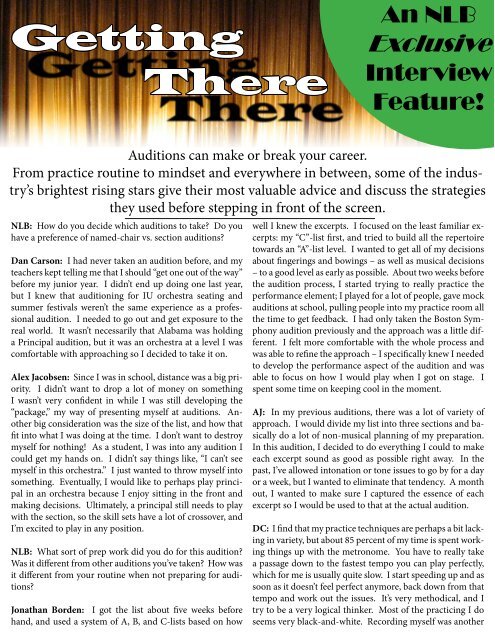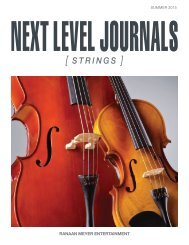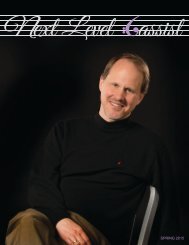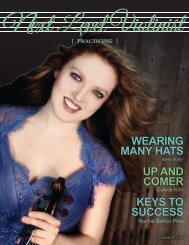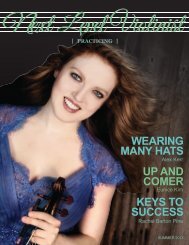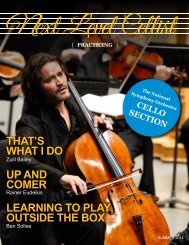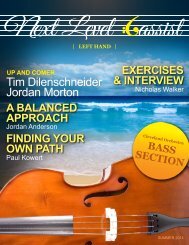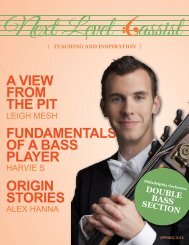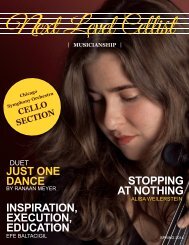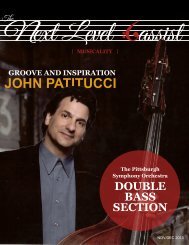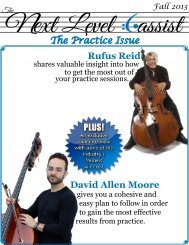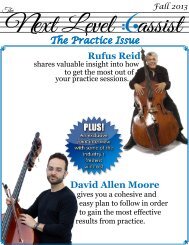The Next Level Bassist - Practicing
Articles by David Allen Moore and Rufus Reid, interviews with recent audition winners, free sheet music by Ranaan Meyer, and more!
Articles by David Allen Moore and Rufus Reid, interviews with recent audition winners, free sheet music by Ranaan Meyer, and more!
Create successful ePaper yourself
Turn your PDF publications into a flip-book with our unique Google optimized e-Paper software.
Getting<br />
<strong>The</strong>re<br />
An NLB<br />
Exclusive<br />
Interview<br />
Feature!<br />
Auditions can make or break your career.<br />
From practice routine to mindset and everywhere in between, some of the industry’s<br />
brightest rising stars give their most valuable advice and discuss the strategies<br />
they used before stepping in front of the screen.<br />
NLB: How do you decide which auditions to take? Do you<br />
have a preference of named-chair vs. section auditions?<br />
Dan Carson: I had never taken an audition before, and my<br />
teachers kept telling me that I should “get one out of the way”<br />
before my junior year. I didn’t end up doing one last year,<br />
but I knew that auditioning for IU orchestra seating and<br />
summer festivals weren’t the same experience as a professional<br />
audition. I needed to go out and get exposure to the<br />
real world. It wasn’t necessarily that Alabama was holding<br />
a Principal audition, but it was an orchestra at a level I was<br />
comfortable with approaching so I decided to take it on.<br />
Alex Jacobsen: Since I was in school, distance was a big priority.<br />
I didn’t want to drop a lot of money on something<br />
I wasn’t very confident in while I was still developing the<br />
“package,” my way of presenting myself at auditions. Another<br />
big consideration was the size of the list, and how that<br />
fit into what I was doing at the time. I don’t want to destroy<br />
myself for nothing! As a student, I was into any audition I<br />
could get my hands on. I didn’t say things like, “I can’t see<br />
myself in this orchestra.” I just wanted to throw myself into<br />
something. Eventually, I would like to perhaps play principal<br />
in an orchestra because I enjoy sitting in the front and<br />
making decisions. Ultimately, a principal still needs to play<br />
with the section, so the skill sets have a lot of crossover, and<br />
I’m excited to play in any position.<br />
NLB: What sort of prep work did you do for this audition?<br />
Was it different from other auditions you’ve taken? How was<br />
it different from your routine when not preparing for auditions?<br />
Jonathan Borden: I got the list about five weeks before<br />
hand, and used a system of A, B, and C-lists based on how<br />
well I knew the excerpts. I focused on the least familiar excerpts:<br />
my “C”-list first, and tried to build all the repertoire<br />
towards an “A”-list level. I wanted to get all of my decisions<br />
about fingerings and bowings – as well as musical decisions<br />
– to a good level as early as possible. About two weeks before<br />
the audition process, I started trying to really practice the<br />
performance element; I played for a lot of people, gave mock<br />
auditions at school, pulling people into my practice room all<br />
the time to get feedback. I had only taken the Boston Symphony<br />
audition previously and the approach was a little different.<br />
I felt more comfortable with the whole process and<br />
was able to refine the approach – I specifically knew I needed<br />
to develop the performance aspect of the audition and was<br />
able to focus on how I would play when I got on stage. I<br />
spent some time on keeping cool in the moment.<br />
AJ: In my previous auditions, there was a lot of variety of<br />
approach. I would divide my list into three sections and basically<br />
do a lot of non-musical planning of my preparation.<br />
In this audition, I decided to do everything I could to make<br />
each excerpt sound as good as possible right away. In the<br />
past, I’ve allowed intonation or tone issues to go by for a day<br />
or a week, but I wanted to eliminate that tendency. A month<br />
out, I wanted to make sure I captured the essence of each<br />
excerpt so I would be used to that at the actual audition.<br />
DC: I find that my practice techniques are perhaps a bit lacking<br />
in variety, but about 85 percent of my time is spent working<br />
things up with the metronome. You have to really take<br />
a passage down to the fastest tempo you can play perfectly,<br />
which for me is usually quite slow. I start speeding up and as<br />
soon as it doesn’t feel perfect anymore, back down from that<br />
tempo and work out the issues. It’s very methodical, and I<br />
try to be a very logical thinker. Most of the practicing I do<br />
seems very black-and-white. Recording myself was another


